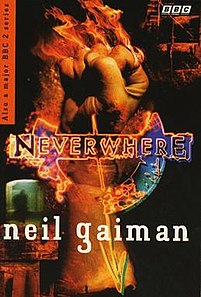 |
| Neverwhere was simultaneously a novel and TV series |
The story centers around Richard Mayhew, who moves to London for a boring desk job. He is engaged to Jessica, a beautiful, stuck-up woman with connections to very wealthy men. Richard can hardly believe he's with such a beautiful woman, and it never occurs to him he might be happier without her. However, one night as the couple rushes to meet with one of her wealthy bosses for dinner, they stumble upon a woman who appears out of thin air, lying on the sidewalk and bleeding. Jessica seems more annoyed than distressed by this person, and when Richard decides to carry her to his apartment (the woman requested not to be taken to a hospital), it's no surprise later when he receives a call from Jessica breaking off their engagement. This will turn out to be the least of his worries.
The woman he carried to his apartment is called Door, and she comes from London Below. She can speak with rats and has the ability to open doors, even those not meant to be opened. She was chased and injured by Mister Croup and Mister Vandemar, two sadistic assassins, not unlike the man Jack from The Graveyard Book. Richard becomes involved by seeking the aid of the Marquis de Carabas, a very quirky and shady, but resourceful character. When Door finally returns to London Below, Richard thinks his life will go back to normal, minus Jessica. However, when he wakes up the next day, it is as though he doesn't exist. People ignore him, somebody else has taken his office, and his apartment is up for lease, a fact he learns while in the bathtub, naked. He realizes he has no choice but to seek out Door in London Below.
This gives an idea of the main plot, but there are also tons of side plots, and I don't have the time or space to talk about all of them. Just know that a huntress becomes involved, as well as rat-speakers, a floating market, an angel, an underground labyrinth protected by a monstrous boar, and a king's court hidden within a subway train car. Also, Door's own story is crucial.
Gaiman writes with a good deal of wit and humor. He carefully unfolds new plot points to keep things interesting, and his characters are all well-developed. The villains, Mister Croup and Mister Vandemar, centuries old, provide humorous banter as well as suspense. They have an appetite for things inanimate as well as living. Richard's inability to cope with his new surroundings sets up some funny situations, but it also makes the reader sympathetic towards him. Door is a strong heroine, and one of those interesting ones. It seems too often that Hollywood equates strong women with action heroes, rather than strength in character, and in return any semblance of personality is gone. I take as a recent example the movie Mirror, Mirror, where Snow White becomes an excellent swordswoman, but she's a very dull character. Gaiman makes Door a strong heroine without sacrificing her personality or turning her into an action hero.
In fact, Gaiman wisely avoids making this into an action extravaganza. Richard, Door, and the Marquis must use their wits rather than their muscle to defeat Mister Croup and Mister Vandemar, who have the ability to move with superhuman speed. How the story unfolds and resolves reveals Gaiman's superior sense of storytelling. Gaiman also uses his fantasy as social critique. London Below is reminiscent of impoverished areas in large cities of developed countries. The more fortunate of us prefer to pretend these areas simply don't exist. And in today's post-9/11 world the novel takes on new meanings as well, particularly in its conclusion. The film, The Hurt Locker, brings a new perspective to Gaiman's conclusion, and those familiar with it will know what I mean.
Once you've entered this world, there's no going back.
I think that the trend you've mentioned is probably my favorite thing in fantasy -- the idea that there could be a hidden world of magic and mystery behind our normal, mundane world. Part of me--well, most of me, really--wants to believe that it could be real. Gaiman does it very well and that's why he's a favorite author of mine!
ReplyDeleteI agree. It's what makes fantasy such great escapism.
DeleteI look forward to reading it.
ReplyDelete